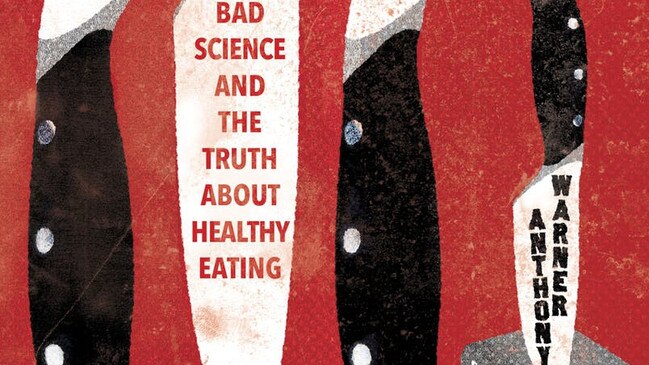Let’s not be fatheaded about obesity
The great panic about fatness has made healthy people miserable and diet quacks rich.

That we are obsessed with the issue of body weight is evident in any week’s headlines (2019 has begun with a big story on children’s sugar consumption) and in the million casual mentions of the body shape of this or that acquaintance or celebrity.
I doubt that any other single issue — including sex — preoccupies us more. Given that we are both increasingly overweight and constantly aware of its undesirability, it’s also likely that nothing makes us more miserable.
The industry that has grown up around that obsession was the subject of Anthony Warner’s first book, The Angry Chef: Bad Science and the Truth about Healthy Eating.

Warner, a professional chef with a science degree, had been writing a blog expressing his fury at the myriad quacks, snake-oil salespeople and careless scientists who devise quick-fix diet regimes to make us thin again and themselves rich.
The root of his chef’s anger seems to have been the belief that we are pathologising a part of life that should be a source of joy and fellowship. His scientist’s anger is that we’re doing it for the wrong scientific reasons.
This second book out now, The Truth About Fat, is about the science of fat and obesity. It starts from the premise that the great claims made (largely in the media) about the scale of the problem and why it exists should be taken apart and re-examined.
Is it true that there is an “obesity epidemic” that threatens tens of millions of lives, which is caused by a combination of gluttony and food industry venality, and which will result, in the words of that famous claim, in our children being the first generation to die at an earlier age than their parents?
Warner notes that the health arguments and the aesthetic judgments about fatness and obesity have got hopelessly mixed up in people’s heads.
A slim man himself, he can see how people deemed to be fat are subject to everyday slights, insults and assumptions about their characters based merely on their body shape. He sees what I see, which is that an almost violent and irrational aversion to fat people is permissible, even among leading journalists on respectable newspapers.
He even expects that reviews of this book will be illustrated with a picture of a huge-stomached person clutching a burger. I hope he will be happy that The Times has gone with Rubens.
The point being that he can clutch a burger and no one will say a thing. “I have led a chaotic and poorly planned life when it comes to food,” he writes (he’s in his mid-forties), and yet he has never put on or lost any significant amount of weight. Nor has he exercised any willpower. He binges sometimes, runs the occasional half-marathon, never goes without, “and yet in those years I have somehow managed to maintain a constant weight”. Without ever trying, and he gets complimented for it.
But, he hypothesises, suppose that “the day after my 25th birthday I accidentally ate 20 more calories than I burned off … the amount that you might find in four olives …”
Then — other things being equal — by the time of his 45th birthday, had he kept it up, he “would have weighed 115 kilograms instead of 75, with a BMI [body mass index] of just under 35”.
What he’s getting at is that the orthodoxy that obesity is a matter of great gluttony and an almost decadent absence of willpower — vastly more calories in over calories expended — is simplistic. And he doesn’t mean the scientific orthodoxy. For this book he spoke to several of the world’s leading scientists in the fields of nutrition, human biology and social epidemiology.
His contention is that obesity and our growing tendency towards being “overweight” is caused by multiple, complex factors. And in his view it doesn’t help that, at the outset, we exaggerate it. He shows, for example, that the claims about our children dying earlier than us are hugely unlikely to be true and that statistics such as the famous one that “300,000 Americans die yearly from obesity” are fictitious.
He also points out that the decision in 1997 by the World Health Organisation to move the BMI number at which “overweight” and “obese” began downwards by two points to 25 in itself created the idea of a sudden runaway problem.
Millions were made fat overnight. “It also classified anyone with a BMI over 25 as being ‘pre-obese’, indicating that once you crossed the new lower threshold, you were destined to slip into more damaging pathologies,” Warner says. “That is a bit like saying any child who is five feet tall will go on to reach seven feet six.”
Warner’s argument is that obesity is not an epidemic, but is endemic. It is not a new AIDS, but a situation inherent in a modern civilisation composed of ordinary human beings living in a new world of calorie abundance. And we should concentrate our medical attention not on the relatively safely overweight, but on that growing but still small minority who are dangerously obese.
The slightly tubby rest of us, instead of engaging in yo-yo dieting, should chuck away the “lose 10kg” new year’s resolution and instead look at losing a sustainable few kilos, eating better and nicer food and doing a sustainable amount of exercise.
And live with the fact that we might not be the ideal body shape for Katie Hopkins, but that it might be the best one for us. Warner comes to this conclusion because, he argues, what we’re learning about hormones and heritability suggests thata significant part of our tendency towards heaviness will be genetic or biological.
This does not mean he’s a denier. He repeatedly agrees that the spread of type 2 diabetes, for example, is a huge threat.
However, he argues that we need to approach the problem carrying an analytical rapier, not the blunderbuss that public health information campaigns tend to use and that we journalists tend to respond to.
Good for him. But he ends up, alas, with an altogether hurried and skimpy vision of an alternative “holistic” approach to building healthy living into our towns and cities. If you’re going to persuade me that Amsterdam may have the policies needed to bust this one, you’ll have to spend more than three pages of a 350-page book on it.
I also understand that being “angry” is Warner’s schtick. Yet when you take on the kind of media/public health orthodoxy that has grown up over obesity, it’s vital to make the reader believe not that you’re furious, but that you really know your stuff.
So I would seriously advise Warner to go back to the relatively few intemperate polemical passages and to the rather more frequent use of the f-word, and cut them out for the paperback. I think he has something important to say and the more people who take him seriously the better.
The Times



To join the conversation, please log in. Don't have an account? Register
Join the conversation, you are commenting as Logout